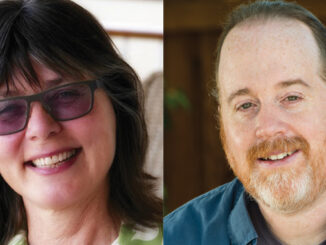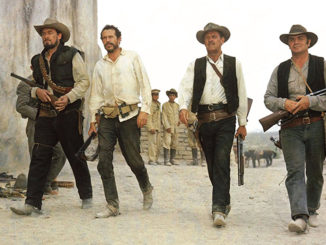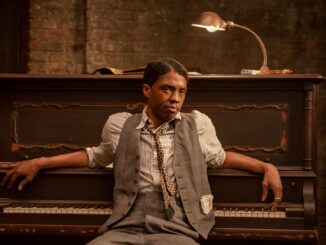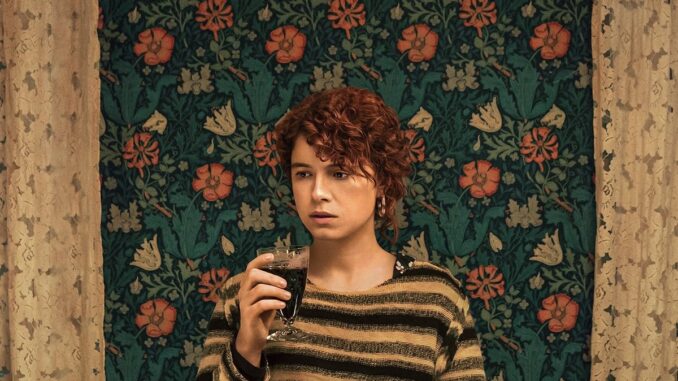
By Patrick Z. McGavin
Charlie Kaufman has a mind like no other — and as his editor, Robert Frazen has a front-row seat in it.
Kaufman, the writer of the acclaimed “Being John Malkovich” (1999) and “Eternal Sunshine of the Spotless Mind” (2004), audaciously intertwines language and character to mediate on essential questions on the nature of identity and creativity.
Kaufman is now an acclaimed director. His third feature, “I’m Thinking of Ending Things,” charts the deteriorating relationship of a young couple (played by Jesse Plemons and Jessie Buckley) that takes radical detours in style and form.
In the Netflix feature, nothing is quite how it appears. Recently, Frazen talked with CineMontage about the wild ride of navigating the interior consciousness of Charlie Kaufman.
CineMontage: You edited Charlie Kaufman’s directorial debut, “Synecdoche, New York” (2008). How did you originally meet?
Robert Frazen: I had edited for Nicole Holocener. Anthony Bregman and Stefanie Azpiazu are her producers, and they are also Charlie’s producers. When they were hiring for “Synecdoche,” they set it up.
CineMontage: What’s your creative collaboration like?
Frazen: It’s great. He is off shooting and putting the film together. We talk a lot, and I take a couple of more weeks to complete an assembly.
He comes in and looks at it, and we start working. Sometimes when you are working on something, you just want to present something to the director and then work on it afterwards. Charlie creates such a safe environment that there’s no need to do that.
CineMontage: His scripts, whether for his own films or for other directors, are unlike anyone else’s. What’s the biggest challenge in preserving the integrity of these very idiosyncratic scripts?
Frazen: That’s a really interesting question. With most projects, there is a little bit of anxiety that goes with wanting it to be successful as possible and creating the vision the director has in mind.
Working with Charlie, there are many layers. He is so great at understanding the process. This sounds weird possibly, but in his case, preserving means editorially kind of forgetting about that and just moving forward with the process and waiting for things to become successful and building upon that rather than try to start off and play four-dimensional chess.
I love Charlie’s writing and directing, and I found the new film to be heartbreaking on many levels. I found a lot of it had to do with relationships, or how you see yourself or how you think people see you. There is freedom to enhance that.
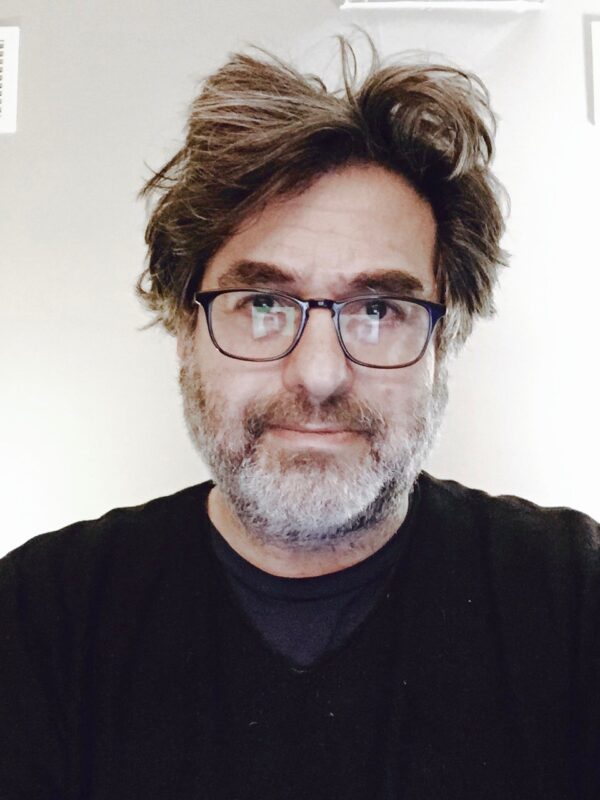
CineMontage: In “I’m Thinking of Ending Things,” how did you select the images of the opening montage, especially fitting with the voiceover?
Frazen: Originally the beginning of the movie had started differently. There was a beautiful opening. As with many times when you are working on a project, it didn’t quite communicate Charlie’s vision. As the story evolves, some things become more important and some things less important.
Charlie shot a lot of what I titled the “memory shots,” glimpses of things that you think about or remember. When the original opening fell away, he thought some form would be a good way of that to start the film.
In addition to pre-recording the voice overs with Jessie Buckley, he was able to get her to read some of the book as well. The (opening montage) was built up from there, what the memories would be and that transitions to seeing her on the street, what she’s looking at in the window. That montage became a way of communicating to the audience what might be in front of them.
CineMontage: The movie is an adaptation of a novel by the Canadian writer Iain Reid. Did you read the novel, or did you prefer to come to the movie fresh?
Frazen: I read the script, and I actually didn’t read the book. I wanted to. I also didn’t mind that I didn’t, and I was hoping that Charlie didn’t care or mind. Charlie wrote the script, and this was the story we were going to tell, so it didn’t really bother me. I had two great and invaluable assistants, Crystal Platas and Daniel Triller.
Crystal read the book, and I would occasionally run into the room and ask her, “What happens here?” Daniel was responsible for the thousands of VFX. Almost all the snow, on the ground and falling, was added after the shoot.
CineMontage: The first major movement in the film is a long car ride of the central couple going to visit his parents. How did you establish the particular dramatic pace and rhythm?
Frazen: That’s a really interesting scene. I think it’s a very elusive scene. That first car drive was worked on the most. It became very elusive, and it needed to establish a lot of things. That scene needed to communicate the language that would be used. It also needed to be emotional.
It was actually much longer, and I think it was broken up and collapsed. A lot of things had to happen because everything that happens after that drive becomes more elliptical. Jake (Plemons) and Jessie Buckley, the voiceover, points of view, reactions to points of view, there was more to be dealt with.
CineMontage: The film is a classic example of the “unreliable narrator,” where key details about characters change, either subtly or dramatically. How much of that is the script, and how much did you and Charlie work on that in post?
Frazen: A lot of it was in the script, or implied, and we eventually worked on all of that. Charlie’s masterful at all things, but I am really in awe of his ability to move story to understand structure.
For example, with the car drive, the relationship needs to exist, and the voiceover, as it becomes clear what we want to see, that was all developed in the cutting room because it’s visual—the layering, the point of views—that all starts to happen as other things fall into place.
You become interested in seeing things, which you can’t necessarily see in the script. The viewer decides as they are putting it together in their heads.
CineMontage: It feels like from the moment they reach the parents’ house, reality becomes more and more tenuous. How does the editing reflect that disssociation?
Frazen: This happened on “Synecdoche” as well. A good example is the barn scene once they get to the house. There is some leaping of narrative, what will happen to the sheep and then we jump cut to another portion of the scene and then another part. Charlie’s ability to understand the story and leap through the story makes the point so much better.
It’s not jumping because something is too long or something doesn’t work. It’s extrapolating on behalf of extenuating a scene, or vice versa, making something protracted or making it longer in order to accentuate the meaning.
CineMontage: There is a lot of interpolated material and repeated references to an older man (played by Guy Boyd) whose connection to the primary story is not immediately clear. Was there a lot of back and forth about how to position that within the main story?
Frazen: It was always ongoing. The role of the older man, especially in the first half, was really important. What we see of him was really essential. The material was repositioned in other places. It was used to shape the character, or show the evolution between him and Jake.
We see this man’s daily routine, getting up, watching TV, going to work, cleaning at the school, and how that would play into the movie. Later on, it becomes more clear about his role and how he is connected to the other characters. We were constantly dropping different moments of him in different places, moving him around, figuring out what would work and what was connected.
CineMontage: The final third of the movie is almost pure abstraction, intermingling dreams and hallucinations, a talking pig, music and dance sequences. It’s very anarchic, just completing eliminating narrative logic.
Frazen: The last third is very nonlinear, but I remember it as the natural progression of moving over to the janitor (Guy Boyd). I know it’s not straightforward, and I know there are a lot of weird things that happen, but it’s very linear to me. There is a lot of wild stuff, but it’s right in line with where the characters are headed.
Everything is put together, the major strokes are completed. As the desires of these characters become successful, it allows for opportunities to develop and the storytelling becomes even more associative and richer.
CineMontage: Have you gotten a lot of feedback from friends or family pondering what it all means?
Frazen: I heard from somebody who loved the film, asking “What the fuck was that all about?” and everything in between. I’m really excited the film remains on people’s minds.
With any project you never know. You always hope. We didn’t have many screenings, and it was unclear how it was going to be received. I’m just really excited that it resonates with people and they are still talking about it
CineMontage: What about your own background? Did you go to film school?
Frazen: I’m from Los Angeles. I didn’t go to film school. I studied English at (the University of California) Berkeley, with designs of being the next Neil Simon.
CineMontage: You had a substantial early career as an assistant editor. How were you able to make the transition to editor?
Frazen: I assisted for a long time, and during that time, it felt really long. Looking back, it was not only instrumental but essential and I was very fortunate to work with editors like Steven Rosenblum, Michael Kahn and Sidney Levin. I think of them and the other editors all the time, and how they would approach things.
I was working with Steve Rosenblum, and I assisted on two films with Edward Zwick and one film with Marshall (Herskovitz). I felt lucky to be a part of their production company, Bedford Falls. They were starting “My So-Called Life,” and they were just really tired of seeing me assist. They were very helpful in helping me move forward.
Back when there was film, there was a lot of waiting around. All those guys, and Claire Simpson as well, I felt very fortunate to work on a lot of great films with a lot of very talented people.
Patrick Z. McGavin is a Chicago-based critic and cultural journalist.


